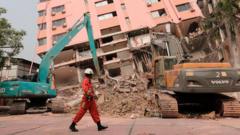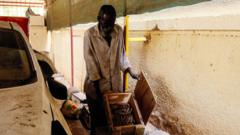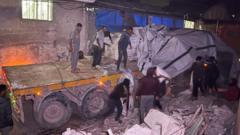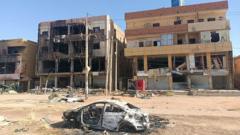Despite recent ceasefire announcements by both the military junta and a coalition of rebel groups in Myanmar, violence continues to erupt in the region, complicating humanitarian efforts following a catastrophic earthquake.
Myanmar's Ceasefires Falter Amid Continuing Violence Post-Earthquake

Myanmar's Ceasefires Falter Amid Continuing Violence Post-Earthquake
Fighting escalates in Myanmar, undermining temporary ceasefires aimed at earthquake relief operations.
Conflicting reports indicate that the Myanmar military executed at least 14 attacks since the ceasefire declaration, undermining hopes for effective relief and aid distribution. The military claims that two rebel factions within the ceasefire alliance have instigated violence, while one rebel group argues that its actions are defensive, responding to military aggression.
Military authorities, represented by Maj Gen Zaw Min Tun, asserted that they would retaliate against what they perceived as unwarranted attacks on their bases. Despite these tensions, the UN High Commissioner for Human Rights, Volker Türk, has called for an immediate end to all military operations and urged the junta to assist those affected by the recent 7.7 magnitude earthquake. The disaster, which struck on March 28, has resulted in an official death toll of 3,564, with over 5,000 others injured and more than 200 missing.
Rescue operations in the devastated city of Mandalay have faced significant challenges, particularly in light of adverse weather conditions that hinder aid distribution. The UN Human Rights office highlighted that while some humanitarian progress has been made in accessible areas, many of the worst-hit regions remain barred from aid due to military restrictions. Local residents have had to take matters into their own hands to provide for the needs of their communities.
UN humanitarian chief Tom Fletcher echoed the urgency of the situation, emphasizing that individuals require vital resources such as food, water, and shelter. He noted that the crisis is exacerbated by pre-existing conditions of conflict and humanitarian need, with nearly 20 million people in need of assistance long before the earthquake struck.
As aftershocks continue to shake the region, the ongoing civil war between the military junta and ethnic militias poses additional threats to already vulnerable populations, creating a complex landscape of humanitarian despair complicated by warfare, natural disasters, and political strife.



















